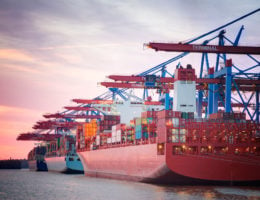The United States-Mexico-Canada Agreement went into force on 1 July 2020, replacing the North America Free Trade Agreement to support mutually beneficial trade between the parties. In this video, Baker McKenzie lawyers from each country share their reflections and the insights they’ve gained during the almost three years since the USMCA took effect.
Baker McKenzie’s Sanctions Blog published the alert titled Sanctions Enforcement Around the G7, The Canadian Perspective on 10 April 2023. Read the article via the link here. Please also visit our Sanctions Blog for the most recent updates.
Baker McKenzie’s Sanctions Blog published the alert titled Canada prescribes Russia and Belarus as non-market economies on 4 April 2023. Read the article via the link here. Please also visit our Sanctions Blog for the most recent updates.
On 28 March 2023, the Minister of Finance introduced Budget 2023, aptly titled a “Made-in-Canada Plan.” A key trade-related theme resonates throughout the Budget: futureproofing the Canadian economy to respond to realignment of global trade patterns. Budget 2023 highlights new policy based initiatives and legislative amendments to address, such as: the global race to net-zero economies and “industries of tomorrow”; “friendshoring” economies to limit dependence on authoritarian regimes for critical goods; domestic supply chain weaknesses; forced labor in Canadian supply chains; and circumvention of economic sanctions.
On 23 March 2023, Canada announced amendments to the Special Economic Measures (Haiti) Regulations in response to “acts that threaten the peace, security, and stability of Haiti.” These amendments list an additional two individuals under the Schedule of the Regulations and took effect on 23 March 2023.
There are now nineteen individuals listed under the Schedule of the Regulations. All of the newly listed individuals are members of the economic and political elite who have “engaged in activities such as orchestrating attacks as well as providing support, particularly in the form of weapons to gangs.
On 27 March 2023, Canada announced further amendments to the Special Economic Measures (Iran) Regulations in response to Iran’s “gross and systematic violations of human rights and ongoing grave breach of international peace and security.” These amendments list an additional eight individuals and two entities under Schedule 1 of the Regulations and entered into force on 23 March 2023.
On 17 February 2023, and pursuant to its obligations under the United States-Mexico-Canada Agreement (USMCA), Mexico’s Ministry of Economy published in the Federal Official Gazette the much-anticipated Administrative regulation that sets forth the goods which importation is subject to regulation by the Ministry of Labor and Social Welfare (Forced Labor Regulation), which prohibits the importation of goods produced with forced labor. Once Mexico’s Forced Labor Regulation becomes effective on 18 May 2023, all three members of the USMCA trade block, Mexico, Canada, and the United States, will have prohibitions and restrictions on the importation of goods made with forced labor.
Baker McKenzie’s Sanctions Blog published the alert titled Canada Imposes Additional Sanctions Against Russia: Prohibition on Steel and Aluminum Imports on 14 March 2023. Read the article via the link here. Please also visit our Sanctions Blog for the most recent updates.
Join Baker McKenzie for a webinar on Forced labor developments in Mexico, Canada and the United States on Thursday, 23 March 2023 from 10:00 am – 11:00 am Central Time. In this webinar, the panelists will discuss Mexico’s implementation of the new Forced Labor Regulation, Canada’s implementation of supply chain transparency legislation, US forced labor enforcement trends, customs forced labor best practices and supply chain due diligence recommendations.
On 27 February 2023, Canada announced further amendments to the Special Economic Measures (Iran) Regulations in response to the “gross violations of human rights” by the Iranian regime. These amendments list an additional twelve individuals under Schedule 1 of the regulations and entered into force on 23 February 2023.






![North America: Forced Labor Developments in Mexico, Canada and the United States [Webinar]](https://www.globalcompliancenews.com/wp-content/uploads/sites/43/2023/03/trade-1-260x200.jpg)

